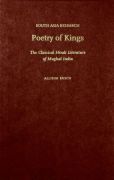
This in-depth study of the classical Hindi tradition brings Mughal-period court culture alive for an English readership. Busch draws on diverse perspectives from literary, social, and intellectual history and brings a major precolonial archive into dialogue with postcolonial theory. This in-depth study of theclassical Hindi tradition brings the world of Mughal-era poetry and court culture alive for an English readership. Allison Busch draws on the perspectives of literary, social, and intellectual history to elucidate one of premodern India's most significant textual traditions, documenting the dramatic rise of a new type of professional Hindi writer while providing critical insight into the motives that animated this literary community and its patrons.Busch examines how riti literature served as an important aesthetic and political resource in the richly multicultural world of Mughal India, and provides,for the first time in a Western language, a detailed study of the fascinatingoeuvre of Keshavdas, whose seminal Rasikpriya (Handbook for poetry connoisseurs, 1591) was the catalyst for a new Hindi classicism that attracted a spectacular following in the leading courts of early modern India. The circulation ofHindiliterature among diverse communities during this period is testament to a remarkable pluralism that cannot be understood in terms of the nationalist logic that has constrained modern Hindi and Urdu to be "Hindu" and "Muslim" languages since the nineteenth century. With the cultural reforms ushered in by colonialism, northIndians repudiated the classical traditions of the courtly past, a complex process given extended treatment in the final chapter.Busch provides valuable insight into more than two centuries of Hindi courtlyculture. Poetry of Kings also showcases the importance of bringing precolonial archives into dialogue with current debates of postcolonial theory. Note on Transliteration and other Textual ConventionsIntroduction: A Forgetting of Things PastChapter 1. Keshavdas of OrchhaChapter 2. The Aesthetic World of Riti PoetryChapter 3. Riti IntellectualsChapter 4. Riti Literature at the Mughal CourtChapter 5. Riti Literature in Greater HindustanChapter 6. The Fate of Riti Literature in Colonial IndiaConclusionGlossaryBibliography
- ISBN: 978-0-19-976592-8
- Editorial: Oxford University
- Encuadernacion: Cartoné
- Páginas: 368
- Fecha Publicación: 03/11/2011
- Nº Volúmenes: 1
- Idioma: Inglés
